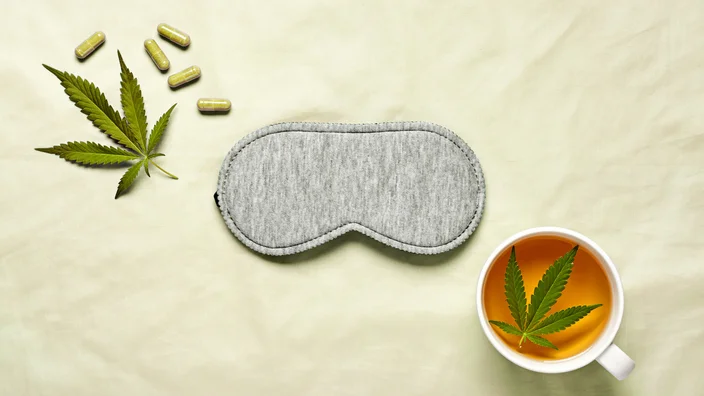Introduction
Getting a good night’s sleep is essential for overall health, yet millions of people worldwide struggle with insomnia, restless nights, or poor sleep quality. As traditional sleep aids often come with side effects or risk of dependence, many are turning to alternative remedies—one of which is cannabis. But the question remains: Can cannabis really help you sleep better?
In this blog, we’ll explore how cannabis interacts with sleep, the science behind its effects, potential benefits and risks, and what current research says about using cannabis as a sleep aid.
How Cannabis Interacts with Sleep

Cannabis contains over 100 active compounds called cannabinoids, the most well-known being THC (tetrahydrocannabinol) and CBD (cannabidiol). Both affect the body’s endocannabinoid system (ECS), which plays a crucial role in regulating sleep, mood, and pain.
- THC is psychoactive and can induce feelings of relaxation and drowsiness, potentially helping you fall asleep faster.
- CBD is non-psychoactive and has a more complex relationship with sleep; it may reduce anxiety and improve overall sleep quality without causing sedation.
Cannabis also contains terpenes—aromatic compounds that can influence the effects of cannabinoids. For example, myrcene has sedative properties, which might contribute to cannabis’s sleep-inducing effects.
The Science Behind Cannabis and Sleep
Research on cannabis and sleep is growing but still limited due to legal restrictions in many countries. Here’s what some studies suggest:
- Sleep Onset: THC has been shown in some studies to reduce the time it takes to fall asleep. This effect can be helpful for people with insomnia or difficulty falling asleep.
- Sleep Duration: Some users report longer sleep duration with cannabis, but the evidence is mixed. While THC may increase deep sleep (slow-wave sleep), it can reduce REM sleep, which is important for dreaming and memory consolidation.
- Sleep Quality: CBD may help improve sleep quality by reducing anxiety and pain, common factors that disrupt rest. However, its effects on sleep architecture are still being studied.
A 2017 review published in Current Psychiatry Reports concluded that cannabis might be a useful short-term treatment for sleep disorders but emphasized the need for more rigorous, long-term clinical trials.
Benefits of Using Cannabis for Sleep
Getting a good night’s sleep is essential for maintaining physical health, mental clarity, and overall well-being. However, millions of people worldwide struggle with sleep issues like insomnia, frequent awakenings, or poor sleep quality. As a result, many are exploring natural alternatives to traditional sleep aids—one of the most talked-about options being cannabis. With its growing popularity, it’s important to understand how cannabis might influence sleep, what benefits it offers, and whether it can truly help you rest better. In this blog, we’ll take a closer look at some key ways cannabis may improve sleep, supported by science and user experiences.
1. Faster Sleep Onset:
One of the most commonly reported benefits of cannabis for sleep is its ability to help users fall asleep more quickly. This effect is particularly associated with cannabis strains or products that have a higher concentration of THC, the psychoactive compound known for its relaxing and sedative properties. THC interacts with the body’s endocannabinoid system to reduce the time it takes to transition from wakefulness to sleep. For individuals struggling with insomnia or difficulty initiating sleep, this faster sleep onset can be a significant improvement, allowing them to get the rest they need without prolonged tossing and turning.
2. Reduced Nighttime Awakenings:
Another benefit some cannabis users experience is a decrease in the number of times they wake up throughout the night. Nighttime awakenings can severely disrupt sleep cycles and diminish overall sleep quality, leaving individuals feeling tired even after a full night in bed. By promoting deeper and more sustained sleep phases, certain cannabis products help minimize these interruptions. This can lead to longer stretches of uninterrupted sleep, which is essential for physical restoration and mental rejuvenation.
3. Anxiety Reduction:
Anxiety is a major factor that often interferes with the ability to fall asleep and maintain restful sleep. CBD, a non-psychoactive cannabinoid in cannabis, has well-documented calming and anxiolytic (anxiety-reducing) effects. By interacting with receptors in the brain that regulate mood and stress responses, CBD can help quiet racing thoughts and reduce feelings of worry or nervousness that might otherwise keep someone awake. This calming influence creates a more peaceful mental state, making it easier to relax and drift off to sleep naturally.
4. Pain Relief:
Chronic pain is a common barrier to restful sleep for many people. Cannabis has analgesic (pain-relieving) properties that can help alleviate discomfort from conditions such as arthritis, neuropathy, or injury. By reducing pain signals and inflammation through its interaction with cannabinoid receptors, cannabis can make it easier for those suffering from persistent pain to find a comfortable position and stay asleep longer. This improved comfort is crucial for achieving restorative sleep, which in turn can contribute to better pain management during waking hours.
Potential Risks and Considerations
While cannabis may help with sleep, it’s important to be aware of potential downsides:
- Reduced REM Sleep: THC’s suppression of REM sleep could affect dreaming and cognitive function over time.
- Tolerance: Regular use can lead to tolerance, meaning higher doses might be needed for the same effect, potentially leading to dependence.
- Withdrawal Symptoms: Stopping cannabis abruptly after long-term use might cause sleep disturbances.
- Side Effects: Some users experience dizziness, dry mouth, or daytime drowsiness.
Tips for Using Cannabis to Improve Sleep
- Choose the Right Strain: Indica strains are generally more sedating than sativa varieties, which can be more energizing.
- Consider CBD Products: If you want relaxation without intoxication, try CBD oils or tinctures.
- Start Low, Go Slow: Begin with a low dose and increase gradually to find what works best.
- Timing Matters: Take cannabis 30 to 60 minutes before bedtime for optimal effect.
- Consult a Healthcare Provider: Especially if you have underlying health conditions or are on medications.
Also Read: What Are Hybrid Cannabis Strains? Benefits and Popular Picks
Conclusion
Cannabis shows promise as a natural sleep aid for many people, particularly in helping to fall asleep faster and improving sleep quality through anxiety and pain relief. However, it’s not a one-size-fits-all solution, and potential risks like REM sleep suppression and tolerance must be considered.
If you’re thinking about using cannabis to improve your sleep, approach it thoughtfully. Start with low doses, monitor your response, and seek guidance from healthcare professionals when needed. As research evolves, we’ll gain a clearer picture of cannabis’s long-term impact on sleep health.

